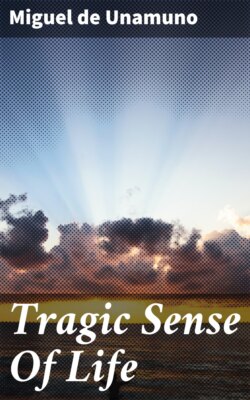Tragic Sense Of Life

Реклама. ООО «ЛитРес», ИНН: 7719571260.
Оглавление
Miguel de Unamuno. Tragic Sense Of Life
Tragic Sense Of Life
Table of Contents
INTRODUCTORY ESSAY
DON MIGUEL DE UNAMUNO
FOOTNOTES:
AUTHOR'S PREFACE
TRANSLATOR'S NOTE
I
THE MAN OF FLESH AND BONE
FOOTNOTES:
II
THE STARTING-POINT
FOOTNOTE:
III
THE HUNGER OF IMMORTALITY
FOOTNOTES:
IV
THE ESSENCE OF CATHOLICISM
FOOTNOTES:
V
THE RATIONALIST DISSOLUTION
FOOTNOTES:
VI
IN THE DEPTHS OF THE ABYSS
FOOTNOTES:
VII
LOVE, SUFFERING, PITY, AND PERSONALITY
FOOTNOTES:
VIII
FROM GOD TO GOD
FOOTNOTES:
IX
FAITH, HOPE, AND CHARITY
FOOTNOTES:
X
RELIGION, THE MYTHOLOGY OF THE BEYOND AND THE APOCATASTASIS
FOOTNOTES:
XI
THE PRACTICAL PROBLEM
FOOTNOTES:
CONCLUSION
DON QUIXOTE IN THE CONTEMPORARY EUROPEAN TRAGI-COMEDY
FOOTNOTES:
INDEX
Отрывок из книги
Miguel de Unamuno
Published by Good Press, 2019
.....
Nor is this the last stage in his deepening and narrowing of the creative furrow. For these souls are in their turn concentrated so that the whole of their vitality burns into one passion. If a somewhat fanciful comparison from another art may throw any light on this feature of his work we might say that his characters are to those of Galdós, for instance, as counterpoint music to the complex modern symphony. Joaquín Monegro, the true hero of his Abel Sánchez (1917), is the personification of hatred. Raquel in Dos Madres[3] and Catalina in El Marqués de Lumbría are two widely different but vigorous, almost barbarous, "maternities." Alejandro, the hero of his powerful Nada Menos que Todo un Hombre, is masculine will, pure and unconquerable, save by death. Further still, in most if not all of his main characters, we can trace the dominant passion which is their whole being to a mere variety of the one and only passion which obsesses Unamuno himself, the hunger for life, a full life, here and after. Here is, for instance, Abel Sánchez, a sombre study of hatred, a modern paraphrase of the story of Cain. Joaquín Monegro, the Cain of the novel, has been reading Byron's poem, and writes in his diary: "It was when I read how Lucifer declared to Cain that he, Cain, was immortal, that I began in terror to wonder whether I also was immortal and whether in me would be also immortal my hatred. 'Have I a soul?' I said to myself then. 'Is this my hatred soul?' And I came to think that it could not be otherwise, that such a hatred cannot be the function of a body. … A corruptible organism could not hate as I hated."
Thus Joaquín Monegro, like every other main character in his work, appears preoccupied by the same central preoccupation of Unamuno. In one word, all Unamuno's characters are but incarnations of himself. But that is what we expected to find in a lyrical novelist.
.....